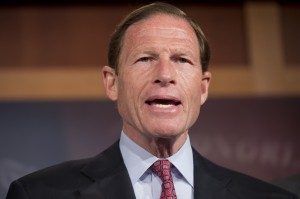
Legislators interested in increased regulation of energy drinks shifted course this week, focusing on the way the products are advertised and marketed rather than their actual ingredients.
On Thursday, Sens. Richard Blumenthal (D-Conn.) and Richard Durbin (D-Ill.) joined an effort by Rep. Edward Markey (D-Mass.) to push the Federal Trade Commission (FTC) to begin investigating the marketing practices of energy drink companies. The move, while not a full strategic pivot, as the agencies often work on parallel tracks to ensure consumer protection, represents something of a strategic recalibration from the two senators’ previous attempts to force the Food and Drug Administration (FDA) to take a harder look at energy drinks.
By sending letters to 14 different makers of energy drinks and energy shots – ranging from Red Bull and 5-Hour Energy to Target Archer Farms and Celsius—the legislators were trying to quiz the companies on their marketing practices as they relate to the effects of their ingredients.
The questions also may be set up to support the possibility that the FTC will inquire about those marketing practices.
“They’ve said, we’re not getting what we want out of the FDA, so let’s go with the FTC,” said Justin Prochnow, an attorney who frequently deals with both agencies. “The letters to the energy drink companies concentrate a little more on ‘do you have the science or substantiation to back it up’ so that they can try prove that they’re making false and misleading advertising.”
The letters, which ask 13 or more questions about the companies’ marketing and scientific practices, could help provide information to allow the legislators to exert more pressure on the FTC to follow up with an investigation.
Markey, who is planning to run in Massachusetts to replace outgoing Sen. John Kerry (D) if Kerry becomes U.S. Secretary of State, first started following a marketing-related line of attack last year. Blumenthal and Durbin have been pressuring the FDA — largely to unsatisfactory ends — since April.
In late November, Markey sent a letter to the FTC inquiring about the possibility of that agency investigating the marketing of energy drinks and shots based on potential deceptive or unfair marketing practices. Shortly after the new year began, the commission responded by telling Markey that any investigation would likely take into account “safety issues relating to consumption of caffeine or other active ingredients,” while “advertising directed to youth… is an FTC priority.”
In its response, the FTC also told Markey “You have raised serious concerns and we will determine what action by this agency is appropriate.”
The companies are not required to answer the questions on the letters, which requested replies by Feb. 1. But not doing so, warned Prochnow, could backfire.
“It’s definitely a PR risk,” he said.
Calls to all three congressional offices were unreturned as of press time.